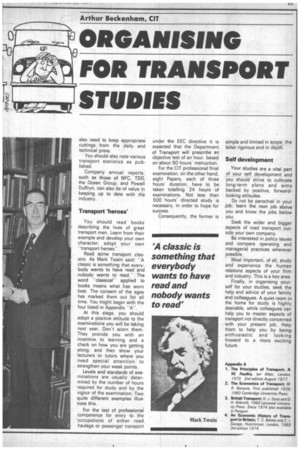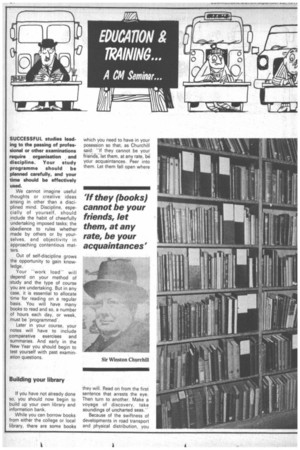ORGANISING FOR TRANSPORT STUDIES
Page 71

Page 70

If you've noticed an error in this article please click here to report it so we can fix it.
SUCCESSFUL studies leading to the passing of profes sional or other examinations require organisation and discipline. Your study programme should be planned carefully, and your time should be effectively used.
We cannot imagine useful thoughts or creative ideas arising in other than a disci plined mind. Discipline, especially of yourself, should include the habit of cheerfully undertaking imposed tasks: the obedience to rules whether made by others or by yourselves, and objectivity in approaching contentious matters.
Out of self-discipline grows the opportunity to gain knowledge.
Your "'work load"' will depend on your method of study and the type of course you are undertaking. But in any case, it is essential to allocate time for reading on a regular basis. You will have many books to read and so, a number of hours each day, or week, must be 'programmed'.
Later in your course, your notes will have to include 'comparative exercises and summaries. And early in the New Year you should begin to test yourself with past examination questions.
Building your library
If you have not already done so, you should now begin to build up your own library and information bank.
While you can borrow books from either the college or local library, there are some books which you need to have in your posession so that, as Churchill said: "If they cannot be your friends:let them, at any rate, be your acquaintances. Peer into them. Let them fall open where they will. Read on from the first sentence that arrests the eye. Then turn to another. Make a voyage of discovery, take soundings of uncharted seas."
Because of the swiftness of developments in road transport and physical distribution, you also need to keep appropriate cuttings from the daily and technical press.
You should also note various transport statistics as published.
Company annual reports, such as those of NFC, TDG, the Ocean Group, and Powell Duffryn, can also be of value in keeping up to date with the industry.
Transport 'heroes'
You should read books describing the lives of great transport men. Learn from their example and develop your own character; adopt your own "transport heroes".
Read some transport classics. As Mark Twain said: ''A classic is something that everybody wants to have read and nobody wants to read." The word ''classical' applied to books means what has worn best. The consent of the ages has marked them out for all time. You might begin with the four listed in Appendix "A".
At this stage, you should adopt a positive attitude to the examinations you will be taking next year. Don't scorn them. They provide you with an incentive to learning and a check on how you are getting along; and they show your lecturers or tutors where you need special attention to strengthen your weak points.
Levels and standards of examinations are usually determined by the number of hours required for study and by the vigour of the examination. Two, quite different examples illustrate this.
For the test of professional competence for entry to the 'occupations of either road, haulage or passenger transport under the EEC directive it is expected that the Department of Transport will prescribe an objective test of an hour, based on about 60 hours' instruction.
For the CIT professional final examination, on the other hand, eight Papers, each of three hours' duration, have to be taken totalling 24 hours of examinations. Not less than 500 hours' directed study is necessary, in order to hope for success.
Consequently, the former is simple and limited in scope; the latter rigorous and in depth.
Self development
Your studies are a vital part of your self development and you should strive to cultivate long-term plans and aims backed by positive, forwardlooking attitudes.
Do not be parochial in your job; learn the next job above you and know the jobs below you.
Seek the wider and bigger aspects of road transport outside your own company.
Be interested in policy issues and compare operating and managerial practices wherever possible.
Most important, of all, study and experience the human relations aspects of your firm and industry. This is a key area.
Finally, in organising yourself for your studies, seek the help and advice of your family and colleagues. A quiet room in the home for study is highly, desirable, while colleagues can help you to master aspects of transport not directly concerned with your present job. Help them to help you by being, enthusiastic and looking froward to a more exciting future.
































































































































